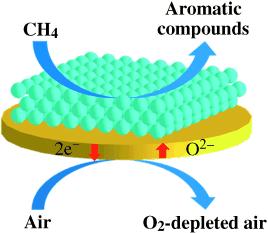Improved Methane Aromatization in an Oxygen-Permeable Membrane Reactor
The conversion of methane, which is the main constituent of natural gas, biogas and shale gas, into liquid hydrocarbons on the methane extraction site would reduce the transportation costs while increasing the recovery and availability. Compared to the conventional liquid fuels production based on syngas as intermediate, methane dehydroaromatization provides a simple, straightforward, and economic pathway from methane to aromatic hydrocarbons without intermediate steps. Although intensive efforts have been devoted to the development of suitable catalysts, challenging problems still exist, such as the rapid catalyst deactivation by coke and the limited methane conversion.
Professor JIANG Heqing, from Qingdao Institute of Bioenergy and Bioprocess Technology, Chinese Academy of Sciences, demonstrated a new concept to transform methane into liquids via methane dehydroaromatization using an oxygen-permeable membrane. The membrane reactor used in their work is based on asymmetric oxygen transporting Ba0.5Sr0.5Co0.8Fe0.2O3?δ(BSCF) perovskite membrane which was manufactured by tape casting and co-firing, consisting of 20?μm thick BSCF dense layer on a porous BSCF support. In the membrane reactor, oxygen permeates from the air side to methane side, where it is consumed in methane dehydroaromatization catalyzed by Mo/HZSM-5. It was found that the addition of oxygen improves the methane conversion, and results in a lower deactivation of the catalyst in the membrane reactor.
This work has been carried out with Prof. JIANG’s collaborators from Leibniz University of Hannover, Forschungszentrum Juelich GmbH and Bayer Technology Services GmbH. And the results have been published in Angew. Chem. Int. Ed. featured as a Hot Paper.
The work was supported by EU through FP7 NEXT-GTL project and the funding from “Recruitment Program of Global Youth Experts” of China.

Adding value with membranes: Improved methane aromatization was achieved by using an oxygen-permeable membrane. The resulting membrane reactor shows a superior methane conversion and a higher resistance towards catalyst deactivation. (Image by Prof. JIANG)
Contact:
Professor JIANG Heqing
Email: jianghq (AT) qibebt.ac.cn